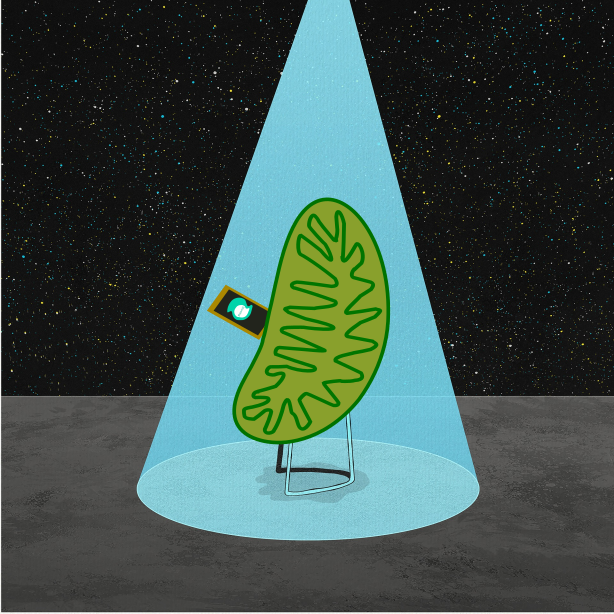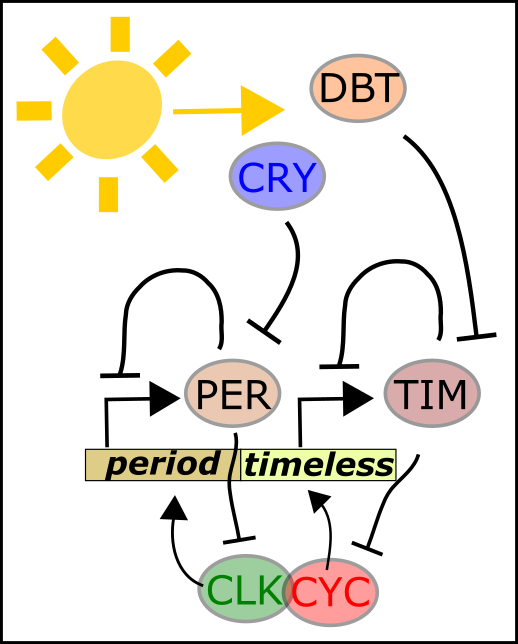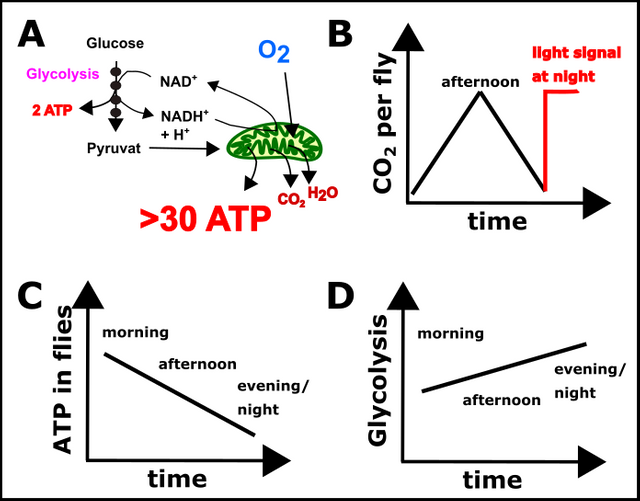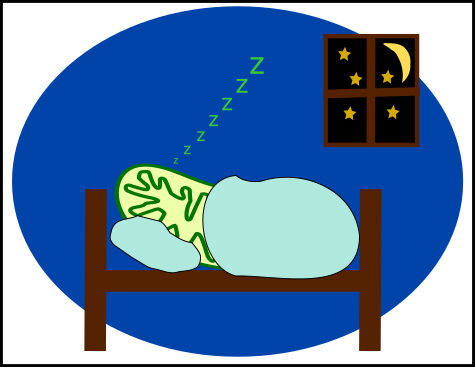Sleep for your life: The reason why light in the night kills your energy!
Following the suggestions of @lemouth and @abigail-dantes concerning smaller articles (approximately 1000 words), I like to try it with a topic I came across last week. It’s about the connection between circadian rhythm (sleep) and mitochondria (energy).

Fig.1 The doomed lonely mitochondrion and the curse of modern communication. Background is from Pixabay, mitochondrion with a smartphone is made by Chapper.
The circadian rhythm
Probably everyone knows that sleep is of huge importance but many people are not aware of the fact that even the time when you go to bed is decisive.
I don't want to go too far into detail but it is a matter of fact that the best time for sleep is the night!
The reason for this dictatorship within your body is the circadian rhythm. In fact, this field of research was pretty controversial for hundreds of years(!) [1,2]. And even today it took until the year 2017 that the Nobel Prize was awarded for this topic. Take into account that sleep is probably one of the most important mechanisms in your life. With this notion, you can estimate how difficult it was to figure out how your inner clock functions.
Important for the circadian rhythm is light and specialized neurons in the so-called SCN [3]. SCN stands for the Suprachiasmatic nucleus and is a tiny region located in the hypothalamus. The neurons of the SCN (by the way the smallest neurons in your brain) are tiny clocks which are getting adjusted by light every day. The first interesting fact is, that the light-detecting cells are not the usual cones and rod cells. Neurons in the SCN are being activated by specialized ganglia cells acting as photoreceptors which even work in blind mice [3].
Light controls a machinery of genes, most important period (PER), timeless (TIM), clock (CLK), cycle (CYC) as well as doubletime (DBT) and cry (CRY) [1,3]. Note: Cursive words in lower cases are the genes, abbreviations in upper cases are the corresponding gene products or proteins. The "clockwork" is as follows (Fig.2):
- Light enters the eye and activates the genes cry and doubletime
- Cry and doubletime producing the proteins CRY and DBT
- CRY and DBT forcing the rapid degradation of the proteins PER and TIM
- Further, PER and TIM are acting together for repressing their own production when the concentration is high enough
- The concentration of PER and TIM elevates again throughout the day (not enough proteins left for suppression!), while the amount of CRY and DBT decreases
- Elevation in the amount of PER and TIM is supported by CLK and CYC
- But CLK and CYC are, in turn, inhibited by PER and TIM
- The highest concentration of PER and TIM is at night (CRY and DBT are not present and the concentration of PER and TIM was not high enough for suppressing their own production)
- Nevertheless, late at night, the concentration of PER and TIM is so high that they start to inhibit their own production again
- The next sunrise will again lead to a rapid decline in the concentration of PER and TIM

Fig.2 Simple illustration of the circadian rhythm. A complex interplay of various genes and proteins regulates the activity of neurons within the SCN (Suprachiasmatic nucleus). Once light enters the eye the protein CRY (and others) are produced and reducing the amount of the proteins PER and TIM. The neurons of the SCN are active now, a new day begins. Within the day the concentration of CRY and others decreases and the amount PER and TIM increases again. In the night PER and TIM achieving their maximum concentration (supported by CLK and CYC) and starting to inhibiting their own production. The next sunlight leads to the next severe drop in the concentration of PER and TIM because of fresh produced CRY. Made by Chapper – unrestricted use allowed.
You see that there is a complex interplay of feedback cycles controlling your circadian rhythm. This cycles can still be carried out even if the SCN is removed from the brain and plated within Petri dishes [3].
In the end, the genes period and timeless are the basis of the circadian rhythm!
Sunlight just prevents that the gene products of period and timeless stay too long which suppresses the activity of the neurons within the SCN.
Therefore, light is solely important for not losing the correct interval (24 hours!).
Once the neurons in the SCN are activated they spread their signals across other brain areas and these areas, in turn, adjusting the clock in the remaining body parts.
These mechanisms are controlling all the biochemical reactions from head to toe.
The paper of Weinrich et al. 2019 [4]
We have already discussed that the mitochondria are producing up to 90% of the energy you need, about 100 kg ATP in total per day (check out my articles here, here and here for more). Therefore, it is of interest whether the circadian rhythm has an influence on the mitochondrial function. Intriguingly, in the last week of September, an interesting paper was published I want to share with you. What makes this paper so special is that the authors used flies (Drosophila melanogaster) and investigated the mitochondrial function within the entire(!) body throughout the day. By doing this they found that respiration (=mitochondrial activity, see Fig.3A) is at highest in the middle of the day. Nevertheless, the amount of ATP lowers throughout the day. At night the mitochondrial function is low and glycolysis peaks. You probably remember that glycolysis is quite inefficient which means your body won't have the capacity for high performance at night (see Fig.3A). What was interesting is that by using light (670 nm wavelength) you can elevate the respiration of the flies even at night. This, however, has tremendous consequences for the natural circadian rhythm.

Fig.3 Illustration of important facts found in the article of Weinrich et al. 2019 [4]. A. Illustration of glycolysis and mitochondrial respiration. B. Respiration of flies within the day. The maximum respiration you can find in the afternoon. Respiration decreases at night but can be interrupted by light. C. ATP content within the body decreases throughout the day. That means ATP is faster consumed than produced. Therefore, the observed respiration in B is no contradiction to this observation. D. While the ATP content declines, the level of glycolysis increases. Nevertheless, this is not sufficient to keep the amount of ATP as seen in C upright. Exact data and details you can find here. Made by Chapper – unrestricted use allowed.
You have to keep in mind that the night is necessary for the regeneration of your body and especially your brain [3]. From the observation of Weinrich et al. 2019 [4] you can estimate that your body is not ready for action at night. With time this may have horrible consequences. Now it's scientifically proven (at least in flies).
Summary
What we can learn here is that working at night or being on parties all the time harms your circadian rhythm and might exhaust your bioenergetic equilibrium. Further, you have to take into account that poor or less sleep accelerates aging (read my article about telomers here, here and here). Do yourself a favor and make sleep to one of the most important moments in your life (at night!!!). This is truly a role sleep deserves. Relax and sleep well! Good night!

Sleeping Mitochondrion - Made by Chapper - Unrestricted use allowed
Regards,
Chapper
Note
This week an article about the purpose of sleep to forget things you experienced has been posted by @scienceblocks. Enjoy
References
[1] V. Greenwood, Chronobiologie: Die Uhren in uns, Spektrum der Wissenschaft 2/19.
[2] J. Osterkamp, Nobelpreis für Physiologie und Medizin: Wie unsere innere Uhr tickt, Spektrum der Wissenschaft 12/17.
[3] M.F. Bear, B.W. Connors, M.A. Paradiso, Neurowissenschaften: Ein grundlegendes Lehrbuch für Biologie, Medizin und Psychologie, 3rd ed., Springer Spektrum, Berlin, 2012.
[4] T.W. Weinrich, J.H. Kam, B.T. Ferrara, E.P. Thompson, J. Mitrofanis, G. Jeffery, A day in the life of mitochondria reveals shifting workloads, Sci. Rep. 9 (2019) 13898. https://doi.org/10.1038/s41598-019-48383-y.
Posted from my blog with SteemPress : http://worldofchapper.de/rp295320-ovh/index.php/2019/10/05/sleep-for-your-life-the-reason-why-light-in-the-night-kills-your-energy/
Hello @Chappertron!! First of all I must thank you for the good information. I've been sometimes said that I must try to sleep well in the night and not at 4 or 5 am as I'm used to. Taking some nap on afternoon. I just think if I make addition with the hours through all the day it will be OK. Now I understand everything about, light, night and sleep!!
I'm glad to find your post through the @Paulag steempress showcase!!
I send my best regards, the best for your projects!
Hey Miguel, thanks for the kind reply. It makes me happy to see that I can help people for staying healthy. To change such things in life is probably not that easy but I recommend you to definitely do this.
Enjoy you life
Best
Chapper
I'll try to do my best for changing this habit of the nocturnal life, even when I feel bohemian or vampire kind!! On my age I need to take more care for health!! Thanks for your response, I'll be attending to your great work!!
Best vibes for you, Chapper!! 🤗
Good luck! And if it works tell us but don't feel forced. Take ya time. Best
Thanks a lot, @ChapperTron!! 🤗
Hey Chapper,
You do produce incredible material. Bringing concision to them makes them all the more inviting to be explored :)
I became aware of the importance and relevance of the circadian rhythm to our health via the works of Dr. Patterson and colleagues's (2016) Ref., which links improvements in glucoregulation and sleep to processes associating nightly fasting with breast cancer prognosis (in rodents).
Your post brought further clarification as to how these mechanisms may unfold. Considering one's body is not at optimum performance at night, not overbearing it with food just allows for regenerative activities to take place.
I'd like to thank you for the clear explanation of the clockwork, which I had never fully grasped, up to now. Uhhuu :D but, now with that understanding I have a couple of questions: are there individual differences in circadian (or the clock genes) sensitivity to light? For example, my husband can fall asleep with a spotlight shining right in his face. Whereas for me, even the tiny blue light from the internet modem keeps me awake :/
Great work Chapper ! And thank you for listening to your audience ;)
Best,
Abigail.
Hey @abigail-dantes, really appreciate that you like the article again.
And yes you are more than right with the food intake.
I have to admit I eat a lot of foods. Can't control it appropriately. However, I have a normal weight (BMI about 20). Nevertheless, sometimes I feel horrible at night and when I get up. That's why I prevent to eat after 6 o'clock in the evening. Today we get visitors and I will prepare burgers for them. Wish me good luck!
The question about the sensitivity I can't finally answer because I'm no expert in these things. I would assume that the genetic background, psychology and lifestyle differences play a role. But I don't want to talk stupid things here. That's why I wish you a nice weekend and promise to inform you as soon as I found an answer.
Best
Chapper
Thank you Chapper :) & good luck with the gathering tonight and all that burger prep !
🍔+🍺=😴=👍
Posted using Partiko Android
Brilliantly summarised!
I know light plays a crucial role in regulating the clockwork. However, the other day I was curious about knowing if unicellular organisms has any homolog of sleep? I landed on this article which talked by circadian rhythm in cyanobacteria. There they talk about metabolism affecting the clockwork. And here we talk about clockwork affecting metabolism. Now I know that perhaps in many animals the clockwork regulation has been centralized. That is to say that apart from different in nocturnal and diurnal species the clockwork is regulated majorly by light input. But I am just curious to know of the clockwork also takes feedback from metabolism itself? How does food we eat affect the clockwork, if at all? Does the microbiome matter too then? Like what if we were locked in dark for weeks, will the clockwork still function and be set by our eating habits?
Hey @sciencevlocks thanks for coming around and the nice words. The entire topic is one of the most interesting issues I ever encountered. Besides the facts you mentioned is the notion that these mechanisms of circadian Rhythm in our Body are high conserved that even flies and fungi functioning of the same principles. This should further emphasize to the people that sleep is more than important, it's life! Thanks for the fruitful Addition. Regards Chapper
Posted using Partiko Android
I enjoy both your long and your short articles. Much information to help us understand our bodies and live better lives. I hope you don't mind that I trouble you with a question:
1.Can we 'fool' the brain with artificial light? If one lives in an environment away from sunlight, can one reset the circadian rhythm by introducing light later in the day (after sunrise) and turning light off later in the night. Thus, literally, turning day into night?
I like best your last illustration, in which the mitochondrian is sleeping peacefully :))
Great work,
Regards,
AG
Hey @agmoore2, thanks for your nice reply again. Yes, I think you can fool your brain. In the absence of natural light, you can readjust your clock, as they do it with the flies. Don't ask me how long it takes. Experiments with people in bunkers or caves have shown that they create their own rhythm after a while. For turning night to day and day to night is, therefore, possible, but I don't know whether they already tried it in this fashion.
Thanks also for the feedback about the sleeping mitochondrion. I always try to find a good story to entertain the people at least a bit.
Have nice remaining weekend
Best
Chapper
great post, informative and easy to read. I took a visit to your WP blog too, nice. I would love to see you turn on the steempress comments. That way, comments left on steem will show up on your blog and comments on your blog will show up on steem.
Hey @paulag, thanks for the kind words. In fact, I had to edit the post a bit (minor errors emerged). This is sometimes which is a bit annoying when you are posting on WordPress and Steemit (edit in one of them don't affect the other, or at least I haven't found out how). But if the message was clear I'm happy with it. And yes, I totally agree about the suggestion that the comments on both blogs will be displayed. But until now no comments were made on Wordpress, that's why I'm not that angry about this yet.
Have a nice weekend
Chapper
update to steem. Its a setting you can select. So when you are on your posts page (no in the actual post but the page the shows your list of post in wp, there is an option to update to steem.. So when you make your changes in wp, select the post and select updated to steem.
Perfect! Thank you for the hint! Best regards Chapper
Posted using Partiko Android
Hey @paulag,
due to it seems like you are quite familiar with Wordpress I want to ask you something. The address of my website is www.worldofchapper.de. Unfortunately, this page is not avaible and I don't know why. My hoster told me that technically everything should be work and recommend to check something in Wordpress (without further details). Do you have an idea what the problem might be?
Thanks even if you can't help
Good night
Chapper
that is really odd. it looks like the page is re-directed to OVH.com. Have you set up a home page? and if so, from your WP dashboard, under pages, can you view it there and does it view correctly?
Hey @paulag,
due to it seems like you are quite familiar with Wordpress I want to ask you something. The address of my website is www.worldofchapper.de
Immer wenn ich deine coolen Artikel lese, bekomme ich immer sofort Lust, den Genome Browser auszupacken oder loszublasten. Gerade stelle ich mir vor, wie es bei meinen mitos wohl aussah, als ich im Juni am Nordkap war und es 24/7 hell war 😂
Posted using Partiko iOS
Ich denke sie haben es verkraftet. In den 60er Jahren war ein junger Mann mal für 11 h wach. Mit allen Problemen (Halluzinationen, Stress, Konzentrationsschwierigkeiten...). Danach schlief er recht lang und war nach 3 Tagen wieder erholt. Das Problem sind chronische Schlafprobleme oder Schlafmangel, aber das weißt du aufgrund deiner Interessen wahrscheinlich besser als ich.
Turn on the genome browser and Beam Da Steem!
Schönes Wochenende
Chapper
And me who is a night owl.... This just ruined all my hopes :D
🤔
good idea! There are so many informations in your posts - so i need time for reading (especially english written) ;-) Thank you for this article - it is important to everyone... Kadna
Thanks, @kadna, these articles are a good occasion for understanding various things better. Often you read or hear something and then you think everything is clear. That you really got it, however, can just be estimated after explaining it to others or writing articles like this. I see it as practice. Thanks for reading! Chapper
This a very good practice! Thank you.
Posted using Partiko Android
Hi, @chappertron!
You just got a 0.25% upvote from SteemPlus!
To get higher upvotes, earn more SteemPlus Points (SPP). On your Steemit wallet, check your SPP balance and click on "How to earn SPP?" to find out all the ways to earn.
If you're not using SteemPlus yet, please check our last posts in here to see the many ways in which SteemPlus can improve your Steem experience on Steemit and Busy.
This post has been voted on by the SteemSTEM curation team and voting trail. It is elligible for support from @curie and @minnowbooster.
If you appreciate the work we are doing, then consider supporting our witness @stem.witness. Additional witness support to the curie witness would be appreciated as well.
For additional information please join us on the SteemSTEM discord and to get to know the rest of the community!
Please consider using the steemstem.io app and/or including @steemstem in the list of beneficiaries of this post. This could yield a stronger support from SteemSTEM.
👍
Posted using Partiko Android